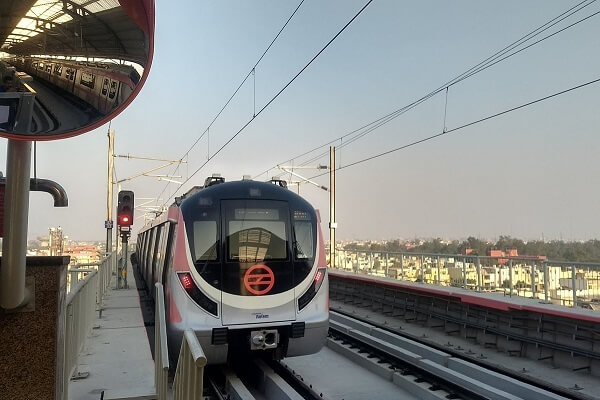 North-South Commuter Railway (NSCR): Modern Train Network Connecting Luzon Island
North-South Commuter Railway (NSCR): Modern Train Network Connecting Luzon Island India launched Bharat Taxi Service as First Cooperative-Owned Digital Mobility Platform
India launched Bharat Taxi Service as First Cooperative-Owned Digital Mobility Platform India places World’s First Live Commercial Order for Hyperloop-Based Cargo Logistics
India places World’s First Live Commercial Order for Hyperloop-Based Cargo Logistics How Weigh-in-Motion Systems Are Revolutionizing Freight Safety
How Weigh-in-Motion Systems Are Revolutionizing Freight Safety Women Powering India’s Electric Mobility Revolution
Women Powering India’s Electric Mobility Revolution Rail Chamber Launched to Strengthen India’s Global Railway Leadership
Rail Chamber Launched to Strengthen India’s Global Railway Leadership Wage and Hour Enforcement Under the Massachusetts Wage Act and Connecticut Labor Standards
Wage and Hour Enforcement Under the Massachusetts Wage Act and Connecticut Labor Standards MRT‑7: Manila’s Northern Metro Lifeline on the Horizon
MRT‑7: Manila’s Northern Metro Lifeline on the Horizon Delhi unveils ambitious Urban Mobility Vision: Luxury Metro Coaches, New Tunnels and Pod Taxi
Delhi unveils ambitious Urban Mobility Vision: Luxury Metro Coaches, New Tunnels and Pod Taxi Qatar approves Saudi Rail Link Agreement, Accelerating Gulf Railway Vision 2030
Qatar approves Saudi Rail Link Agreement, Accelerating Gulf Railway Vision 2030
DDA approves revised Transit Oriented Development policy of Delhi

New Delhi, India (Urban Transport News): The board of Delhi Development Authority (DDA) 18th March 2021 approved the revised Transit-Oriented Policy (TOD) for Delhi, prepared to unlock the latent economic potential by facilitating compact vertical development around public transport hubs.
The decision was taken in a meeting of the Delhi Development Authority (DDA) chaired by Lieutenant Governor Anil Baijal.
"In order to leverage existing and upcoming public transit infrastructure to integrate land use and transportation in the city, and unlock the latent economic potential by facilitating compact vertical development around public transit nodes, the Authority has given final approval for the modification to notified Transit-Oriented Policy (TOD) in Delhi," said in a statement issued by Delhi Development Authority.
Last year on December 23, preliminary approval for the revised TOD policy was given and after that, a notice was issued for inviting objections and suggestions from the Public by the Authority.
"All the objections and suggestions received were placed before the Board of Enquiry and Hearing. The modified TOD policy shall be forwarded to the Ministry of Housing and Urban Affairs (MoHUA) for its approval and final notification," it has been said.
On December 24, 2020, the Central Government had notified the Transit-Oriented Development (TOD) Policy for Delhi as part of the Master Plan of Delhi 2021.
Thereafter, the Delhi Development Authority (DDA) in consultation with major mass rapid transit agencies like the Indian Railways, Delhi Metro Rail Corporation (DMRC), National Capital Region Transport Corporation (NCRTC), Delhi Integrated Multi-Modal Transit System (DIMMTS), and real estate developers of National Capital Region (NCR), had proposed modifications in the existing TOD policy to make it more pragmatic in the larger public interest.
"The revised policy can potentially improve public transit ridership, reduce vehicular congestion, and reduce greenhouse emissions and pollution in the long term," said the Authority.
Apart from the metro and railway stations, the revised policy will also enable node-based transit-oriented development around upcoming modes of public transit like BRTS/LRT/Metro Lite/Metro-Neo, thus making TOD policy of Delhi future-ready, it said.
"The revised TOD policy will allow mass public transit agencies to utilise their operational area like tracks, stations, depots for development, facilitating the use of more effective and sustainable operation and maintenance models for the transit agencies," the official statement said.
"As another major impetus to enable the development of well-integrated multi-modal transit hubs, the revised TOD policy has identified Anand Vihar, Sarai Kale Khan and Kashmere Gate as key locations to be jointly developed as Multi-Modal Hubs, ensuring seamless integration between various transport services, providing concourse level integration under one single roof, wherever feasible," it has been said.
In the revised TOD policy, a total of 12 transit nodes have been identified for the project in the first phase. Those names are Kashmere Gate Multi-modal Transit Hub, Nizamuddin/Sarai Kale Khan Multi-modal Transit Hub, Anand Vihar Multi-modal Transit Hub, New Delhi Railway station, Dwarka Sector-21 metro station and, Dwarka Sector-8 to Sector-14 metro stations section of Delhi Metro Rail network.
Jangpura RRTS station, Haiderpur Badli Mor metro station (Mukarba Chowk), Rohini Sector-18 metro station, Mukundpur metro station, Karkardooma pink and blue line metro stations taken together, and Trilokpuri metro station, the statement said.
The compact development under TOD policy ensures ample provision of open and green spaces, up to 30 percent of the total area, with at least 20 percent as public green space, promoting walkable precincts in the TOD nodes, the DDA said.
"Additional development control norms regarding active frontage, parking, and other building controls have been added for creating more vibrant public spaces that not only promotes walking, non-motorised transport and public transport as efficient modes of transport but also ensures sustainability provisions as an underlying feature of all the proposed development under TOD," it said.




